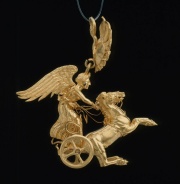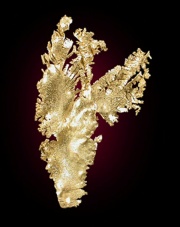Gold
Description
A soft, inert, shiny yellow metallic element that is beautiful and easy to work. Gold has been highly valued and used for artifacts since before 5000 BCE. Alluvial deposits were used in Iran, Turkey, Egypt, Greece, India, and China. In medieval Europe, most gold was obtained from Saxony and Austria. Major gold deposits have been found in South Africa, Columbia, Australia, Russia, Canada (Yukon) and the U.S.(California). Native gold, found in quartz veins (vein gold) and alluvial deposits (placer gold), generally contains some Silver and Copper. The present main world producers are : China, Australia, United States, Russia, South Africa, Peru, Canada, Indonesia, Uzbekistan, Ghana. Gold is purified by dissolution in Mercury or cyanide solutions, by melting, or by electrodeposition. The purity of commercial gold is expressed in karats which is the number of parts of gold in 24 parts of the alloy. Gold is extremely malleable and can be pressed into a continuous film of 0.1 micrometer thickness. Gold is primarily used for monetary systems and for jewelry. Other uses for gold include conductor in electrical devices, dentistry, as a pigment in paints and ceramics and for gilded decoration.
See also White gold, Yellow gold, and Green gold.
Synonyms and Related Terms
Au; aurum (Lat.); Goud (Ned.); or (Fr.); Gold (Deut.); oro (It., Esp.); ouro (Port.); guld (Sven.); burnish gold
Other Properties
Inert. Not attacked by acids, air, or oxygen. Soluble in aqua regia, alkali cyanides, thiocyanates, or mercury.
Isometric crystal system occuring as octahedral or cubic forms; often distorted. Luster = metallic. Streak = goldish-yellow. Ductile and malleable.
| Composition | Au (atomic no. 79) |
|---|---|
| CAS | 7440-57-5 |
| Mohs Hardness | 2.5 - 3.0 |
| Melting Point | 1064.76 |
| Density | 19.3 |
| Molecular Weight | atomic wt = 196.9665 |
| Boiling Point | 2700 |
Hazards and Safety
May be tarnished by sulfur. No significant health hazards.
Fisher Scientific: MSDS
Additional Information
° O. Untracht, Metal Techniques for Craftsmen, Doubleday and Co., Garden City, NY, 1968.
° Mineralogy Database: Gold
° Web Elements: Website
Additional Images
Sources Checked for Data in Record
- Van Nostrand's Scientific Encyclopedia, Douglas M. Considine (ed.), Van Nostrand Reinhold, New York, 1976
- Random House, Webster's Encyclopedic Unabridged Dictionary of the English Language, Grammercy Book, New York, 1997
- The American Heritage Dictionary or Encarta, via Microsoft Bookshelf 98, Microsoft Corp., 1998
- G.S.Brady, Materials Handbook, McGraw-Hill Book Co., New York, 1971 Comment: p. 371
- Richard S. Lewis, Hawley's Condensed Chemical Dictionary, Van Nostrand Reinhold, New York, 10th ed., 1993
- The Merck Index, Martha Windholz (ed.), Merck Research Labs, Rahway NJ, 10th edition, 1983 Comment: entry 4526
- Encyclopedia Britannica, http://www.britannica.com Comment: gold" Encyclopædia Britannica [Accessed December 11, 2001].
- Matt Roberts, Don Etherington, Bookbinding and the Conservation of Books: a Dictionary of Descriptive Terminology, U.S. Government Printing Office, Washington DC, 1982
- Dictionary of Building Preservation, Ward Bucher, ed., John Wiley & Sons, Inc., New York City, 1996
- C.W.Chesterman, K.E.Lowe, Audubon Society Field Guide to North American Rocks and Minerals, Alfred A. Knopf, New York, 1979
- The Dictionary of Art, Grove's Dictionaries Inc., New York, 1996 Comment: 'gold'
- David C. Scott, Metallography and Microstructure of Ancient and Historic Metals, The Getty Conservation Institute, Los Angeles, 1991 Comment: specific gravity = 18.88
- Michael McCann, Artist Beware, Watson-Guptill Publications, New York City, 1979
- R.D. Harley, Artists' Pigments c. 1600-1835, Butterworth Scientific, London, 1982
- Jack Odgen, Jewellery of the Ancient World, Rizzoli International Publications Inc., New York City, 1982



